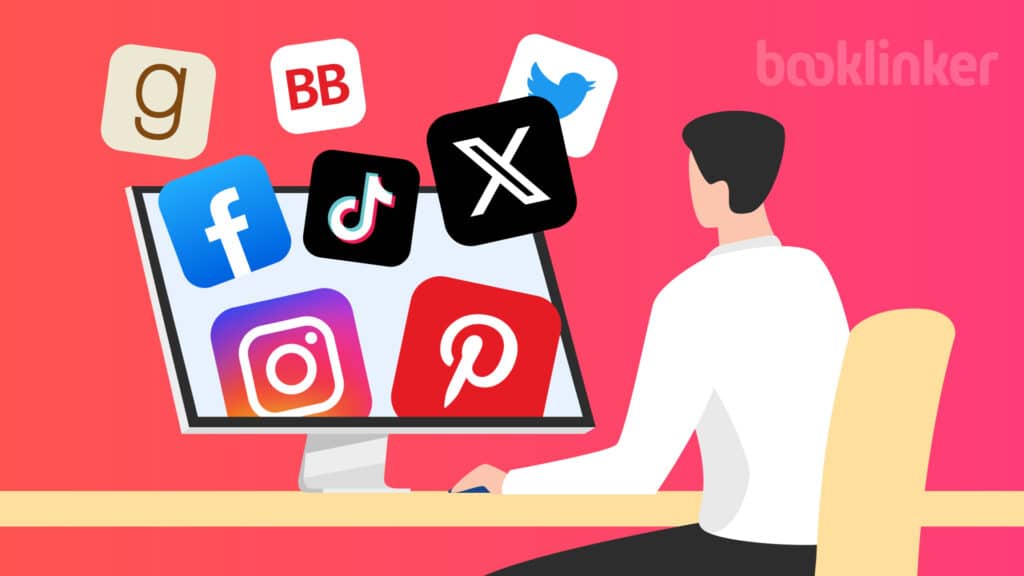
Unlike many other book marketing methods, social media is typically a channel most authors take part in, but don’t utilize to their best advantage.
Many authors spend too much time posting, but aren’t focused on creating relationships with readers, or worse only share, ‘buy my book’ posts making them lose followers.
They spend time on accounts unrelated to the world of books and movies, creating a following who may never pick up a book, much less buy one online.
These strategies can be a time sink, keeping you from gaining lasting fans.
Booklinker is here to change that.
We spoke to KJ Waters, an international bestselling author, creator of the Stealing Time Series, and an author consultant (KJ Waters Consultancy) and asked her to share her ultimate guide to social media for authors.
Without further ado, let’s jump right into it.
Table of Contents

Key Takeaways
- Strategic Use of Social Media: The article emphasizes the importance of authors using social media strategically to connect with their target audience. Instead of just promoting their books, authors should focus on building relationships with readers and engaging in communities related to their genre.
- Choosing the Right Platforms: It’s crucial for authors to select social media platforms that align with their genre and reader demographics. Authors should also consider the type of content they are comfortable creating when choosing a platform, such as text and graphics for Twitter or Facebook, and videos for TikTok or Instagram.
- Balance and Timing: The article advises authors to start building their social media presence early, even before their book is published, to cultivate a following. However, it’s important to maintain a balance between social media activity and writing.
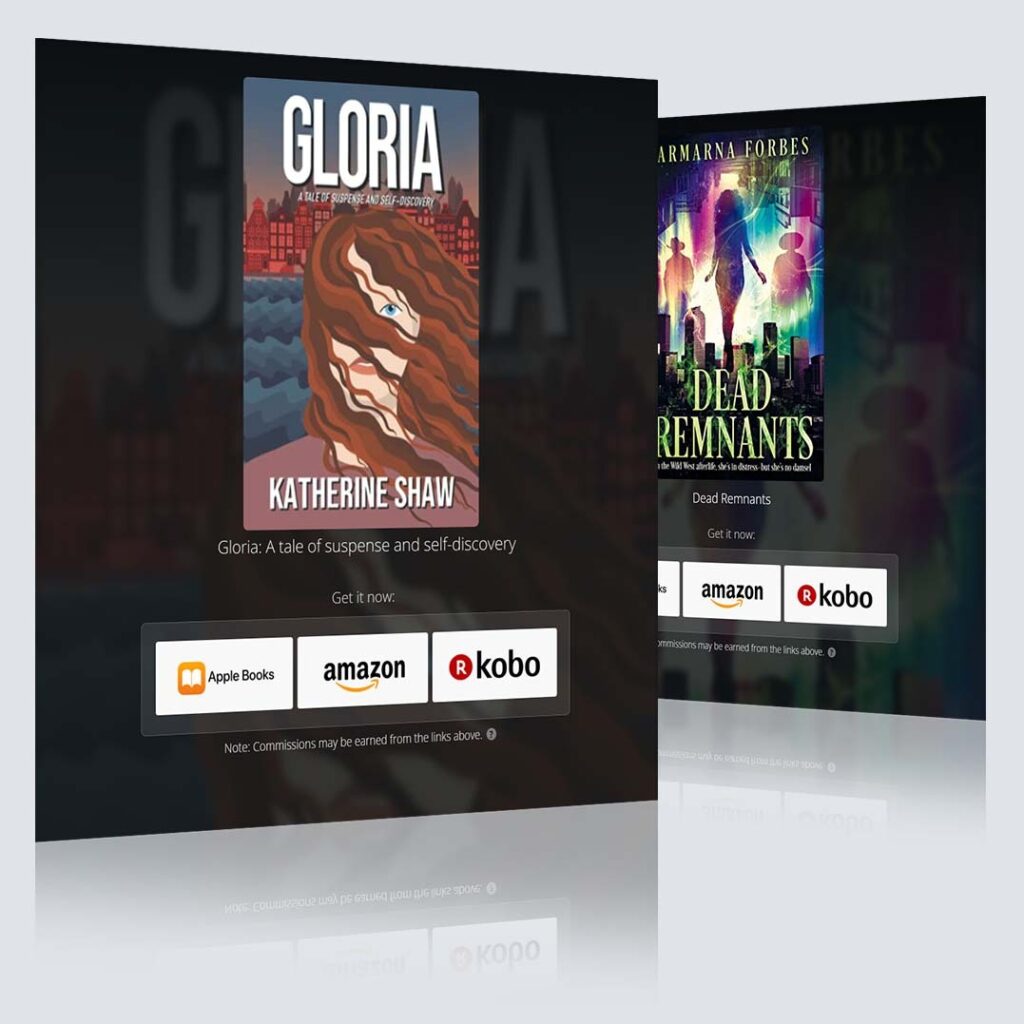
Free Universal Book Links
- Boost international sales by geotargeting readers
- Book store links update automatically based on availability
- Advanced marketing analytics
- Increase clicks with trusted links
Why Social Media Is Important For Authors
Regardless of whether you’re a published author or still getting your first book out, social media can be a powerful tool to find readers and even super fans for your work for free!
Used properly, it is a way to build buzz toward your next release, find new readers, and share reviews of your already published books, while building relationships with readers who enjoy your genre.
It’s also an amazing way to find fellow authors who are working toward the same goals.
A Social Media Success Story
Here’s a story that shows just how powerful social media can be.
I was taking a while between my first and second book, and published a short story called Blow, to keep my fans engaged.
I hadn’t mentioned I was working on the short story until it was ready to be published.
Then I posted the cover and links on Facebook, then shared on my Twitter account, pinning the post to my page so anyone stopping by would see and share it.
My intent was to buy some ads and make a big push to let people know I’d published something new, but I got sick with strep and had to bail on that plan, hoping to get to it when I was feeling better.
The next day I slept in late and awoke to a text from a fellow author friend (who I’d met on Twitter) informing me the book reached number eight in one of its categories on Amazon.
I was shocked!
Why this worked:
- My accounts were full of readers, not just any random Joe who wanted to connect.
- I shared content focused on the themes in my books (severe weather and time travel)
- I spent a few minutes every day sharing book posts from similar authors, who, in turn, amplified my posts.
Once organic sales blossomed, Amazon’s algorithm kicked in, showing my book to interested readers, leading to a feedback loop of sales.
While I don’t recommend this strategy to launch a book, it shows my sales were purely due to my previous social media efforts.
Don’t get me wrong. Social media can be a huge time suck if you’re not spending your time on the sites wisely, but a focused effort can reap great results.
When Should an Author Start Worrying About Social Media
Tip!
- It’s never too early to build a following on social media. If you’re working hard on your manuscript, grow those accounts.
Waiting until your book is out is a huge mistake. Fine tune your following to potential readers in your genre.
How?
Find similar authors and follow their fans. If you spend five minutes a day, or a half hour a week growing your accounts, it will pay off when you’re ready to sell your books.
But spending time on social media is not the same as curating content and finding readers in your genre. Stay focused or it won’t be the best use of your time.
But your priority should be to get books out.
If you can manage a healthy balance of writing and growing your social media accounts, then go for it. It is an investment in your future sales.
Just be careful of the time trap that social media can be.
Personal vs Business Accounts
Another thing to point out before we discuss the social media platforms is the difference between personal and business social media accounts.
Business accounts on social media have different levels of permissions and powers that make it optimal for those trying to use them as a marketing channel.
But all social media business accounts are not created equal.
Do a little research on the benefits of converting to a business account.
Some may throttle your reach for a business account, where others offer an excellent suite of tools when you convert.
For example, advertising on Meta platforms is only available with a Facebook author page.
To promote your work, you’ll need to create a page connected to your regular account and promote from this author page.
One word of warning:
If you decide to use your social account for social media marketing, you’ll want to curate it more for your publishing world.
Posting your latest short story in the same place as your political views might not be a great idea and lead to a backlash.
To quote Shark Tank’s Kevin O’Leary, an expert in product branding,
“When you take a polarized position on any subject you will alienate 50% of your audience 100% of the time.”
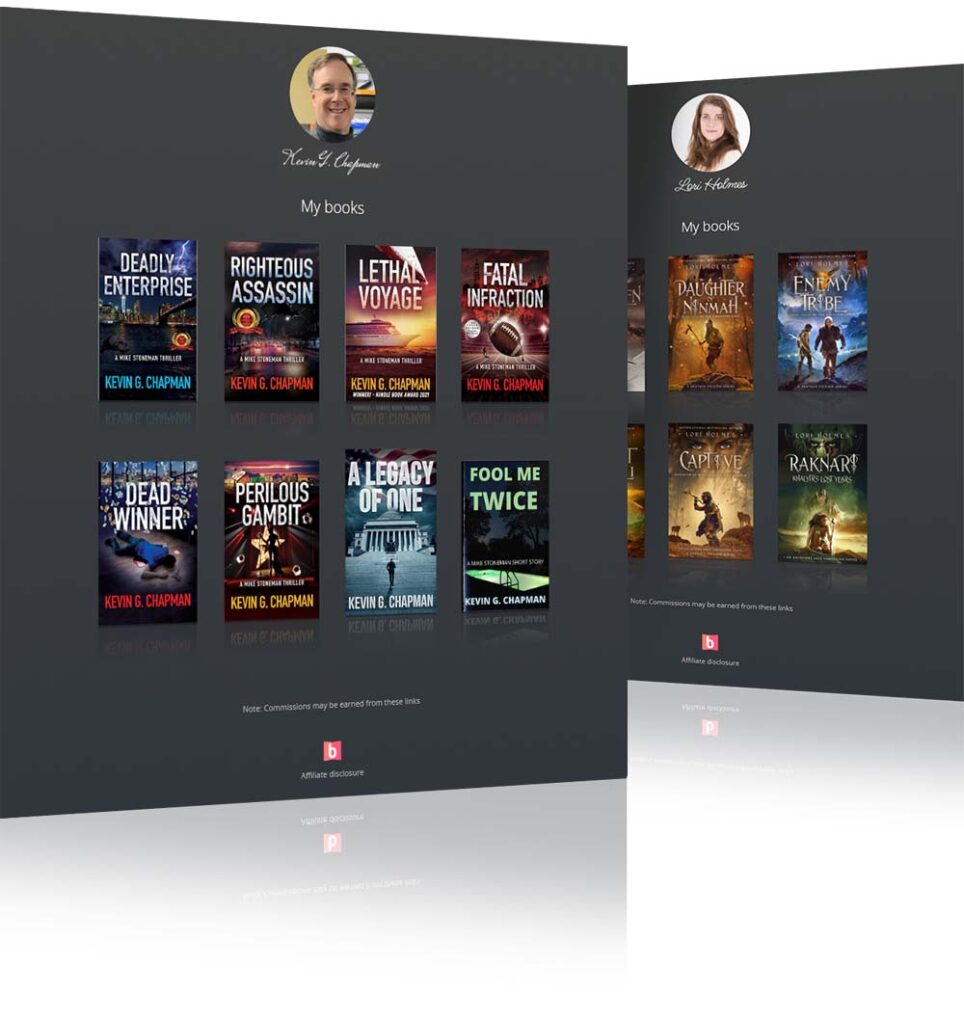
Introducing:
Booklinker Collections
One landing page for all your books. 100% free.
One link for easy sharing of your books across your backmatter, websites, emails, and social media.
Organic vs Paid Social Media
On social media, there are two main ways your content will reach your audience: organic or paid.
Your organic reach describes your followers who see your posts in real time on your feed.
This typically includes all the people that follow you, engage with you, or like similar accounts to you, depending on the platform.
Paid reach is the extra boost you get from purchasing ads or boosting a post.
These can either waste a lot of money or focus your efforts on sales, growing your platform, or getting engagements.
Which Social Media Platform(s) Should You Choose?
Each social platform has pros and cons. The most obvious is who is active on the site.
Tip!
- To make the best use of your social media time, consider who is your target reader.
If you write women’s fiction who average over thirty years old, Pinterest might be a good place to start with an active audience of 431 million users, 77% are women.
Pinterest has the added bonus of indexing all of its content on Google, so anyone searching for you will find your content there.
If you write young adult books about dragons, your audience skews a lot younger. You may find it beneficial to spend more time on TikTok or Instagram to connect with your audience.
It is difficult to post on all the social channels well while saving time to engage on every platform.
Select a few channels that are rich with possibilities for connecting with your readers, rather than spreading yourself too thin.
What Content Do You Enjoy Making?
Another consideration for choosing the right social channel is to think about what type of content you enjoy making?
If you are camera shy, then YouTube is probably not a good fit with the demands of video content.
If you prefer to write text and share graphics, Twitter/X or Facebook might be more comfortable for you.
Play into your strengths as a creator and match it with the platform’s demographics.

Facebook is a great place for authors, due to the sheer numbers of users on the platform, with over 2.93 billion members.
On Facebook you share status updates in text, images, short videos, with links on a page, in groups, or boosted through Facebook ads.
Facebook Groups are communities inside Facebook that can be public or private who share posts with common interests. Many authors on Facebook join groups based on their genre.
Facebook Pages are a type of Facebook profile that businesses and/or public figures can create in order for their audience to follow them. Authors fall under this category, so we’ve created the ultimate guide to Facebook Author Pages.
Upon creating a Facebook Page, you’ll gain access to the Meta Business suite, where you can control all your marketing and advertising activities on the platform.
Facebook’s Ad tool is likely the most advanced ad platform out of all social media platforms, and could be an entire guide on its own, but we’ll touch on it briefly here.
Facebook’s Ad tool allows you to target Facebook users based on their demographics.
This can be anything from gender, country, age, their interests, and even their buying habits.
For example, you can run an ad to promote your new women’s fiction release to:
- Women in the United States
- Who make online purchases
- In the age range of 30-60 years old
- Who have shown an interest in a best-selling author who writes similar books
- Owns an eReader
You can target anything Facebook collects, which is a lot of data.
Why should Authors use Facebook?
Tip!
- Authors should consider using Facebook as it’s the largest social media platform in the world, with powerful features to help get your books in front of readers.
As long as your audience is active on the platform, (i.e., not geared toward teens), it can be a productive core element of your author book marketing strategy.
Strengths of Facebook:
- It’s a simple platform to use
- Almost 3 billion active users
- Facebook pixel and ad platforms are powerful
- “Easy” to direct traffic off the platform
Weaknesses of Facebook:
- Not as popular with younger audiences
- Involved in a lot of controversy
- Heavy moderating and censorship
Example of an Author Doing Facebook Well: Shawn Inmon
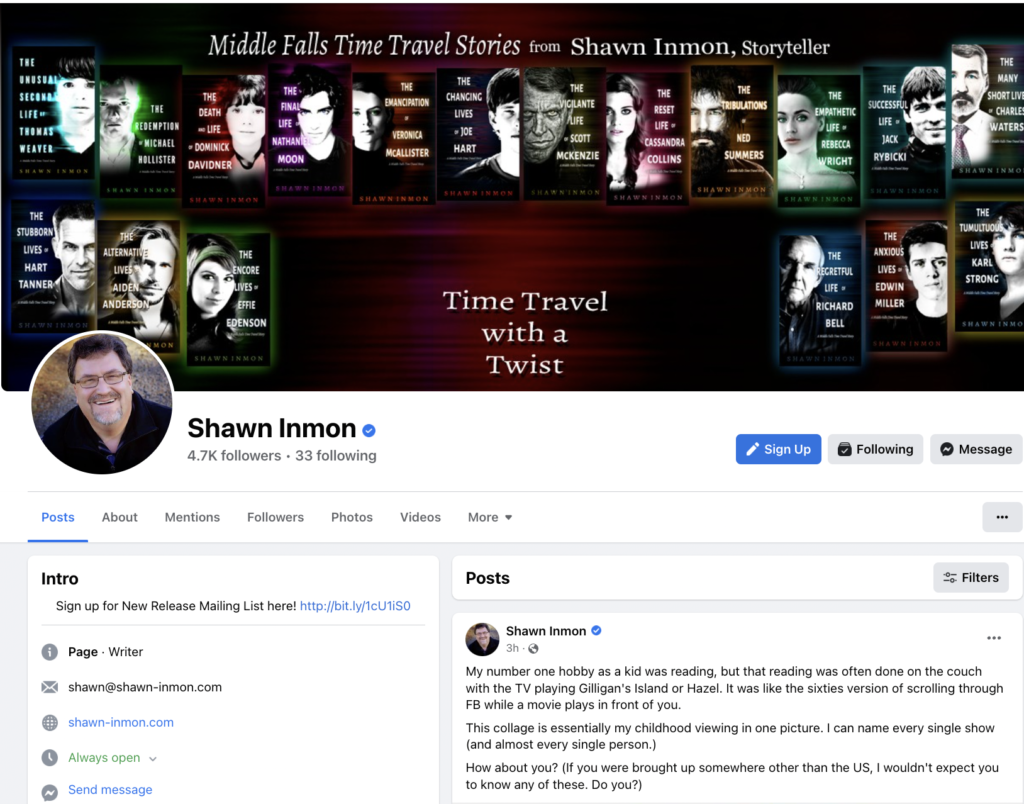
Shawn Inmon has done an incredible job building out his Facebook Author page.
He displays his distinct personality and sense of humor in his multiple daily posts.
Whether it’s a witty joke, personal story, or launch of a new book, his posts get lots of engagement from his dedicated fans.
These posts are then shown on potential readers Facebook pages, leading to passive book sales.
He’s also included a call to action in his bio where readers can sign up for his email list, in order to stay up to date with this content.
Tiktok

TikTok specializes in short form video content, typically with lots of action and cuts.
There’s a section of TikTok known as #Booktok that’s rapidly growing, and is one of the leading ways readers discover books on social media.
In fact, it’s so successful, even bookstores are jumping on the trend. Barnes and Noble has a few tables dedicated to books trending on TikTok.
The platform has over 1 billion users, with nearly 48% of them being between the ages 10 and 29.
The main reason for TikTok’s success has been the power of the “For You” page algorithm. Unique to TikTok, it is an addictive format that predicts what type of content a user will find interesting.
Because of this, I recommend you focus your time on the platform engaging with authors and readers on the #BookTok content as soon as you create an account, in order to tell TikTok this is what your accounts are about.
As a new user, the platform will boost your early posts to a larger “For You” audience, so don’t squander the opportunity.
TikTok is also a great platform to find book influencers who can add your books to their content and get some virality going. TikTok’s ad tool is still in its early stages. Because of its infancy, it can be an untapped market, and may be worth looking into.
That being said, selling books directly on TikTok can be difficult, as the only way to direct traffic off of the platform is through a link in your bio.
Limited linking on the platform makes it a perfect place to insert a Booklinker link or Geniuslink universal book link.
Why should Authors use TikTok?
Tip!
- Authors should use TikTok if they enjoy making video content and leveraging their creativity. It’s a fun and exciting “new” platform that authors have been finding a lot of success on.
Example of an Author Doing TikTok Well: Colleen Hoover
Colleen Hoover, is considered a #BookTok sensation, when her novel, It Ends with Us, became popular on the platform in 2021.
In 2022, eight of the top twenty-five best sellers were hers, making her one of the top selling authors of the year, including the top three titles.
She’s amassed over 1.4m followers on the platform, posting casual short form content about books she’s writing or just days in her life. A combination of both content types help build trust and anticipation for her book releases.
Twitter/X

Despite a few stumbles, the platform is undergoing a transformation and with an innovator like Musk at the helm, it has the potential to take over some of the incredible features of TikTok without the risk of being banned in your country.
Twitter is a large platform with over 450 million users as of 2023. Twitter’s demographics has a slight lean toward males (56%) with over half between the ages of 25 and 49 years old.
It’s hard to say if any particular book genre stands out on the platform, but again, due to its large user base, any genre can do well here.
Similarly to Facebook, content on the platform is short form text, images, and videos.
The main way to discover content on the platform is via your feeds. The two feeds on the platform are the “For You” feed, and the “Following” feed.
The “For You” feed, is where the algorithm gauges your interests and shows you content you might like to engage with. Your “Following” feed only features content from those you’ve chosen to follow.
Twitter has a unique feature that shows trending topics. You can also search for content or indexed hashtags. These are great tools for identifying and hopping on trending topics.
One tip is to find trending topics related to your book content. For example, I have a client who writes crime novels about cartels in Mexico who uses trending hashtags to find readers interested in the topic.
Twitter’s Strengths
- Large active audience
- They are constantly innovating and growing the platform
- You can reach a large audience by taking advantage of trending topics and hashtags
- You can pin tweets to keep your favorite content on the top of your page
Twitters Weaknesses
- Advertising and API aren’t the greatest
- It isn’t geared towards readers or writers.
- Growing pains as the platform undergoes changes
- Stubstack and other links are banned, reducing its link sharing ability.
Why should Authors Use Twitter?
Example of an Author Doing Twitter Well: KJ Waters
For our Twitter example, we’re going to take a look at… me!
As you can see from the above screenshot, I’ve gained over 29k followers on the platform.
I started off on the platform by networking and following with other like minded authors.
Once I started getting some traction, I automated my content ahead of time using social media scheduling tools.
I mostly share educational content relating to authorship and digital marketing along with the occasional funny meme.
Occasionally, I promote my own books and new releases, along with some enticing text. In the case below, I shared a positive review along with a call to action to buy my book. It got a lot of traction so I leave it in the pinned Tweet section, where it will get the most eyeballs.
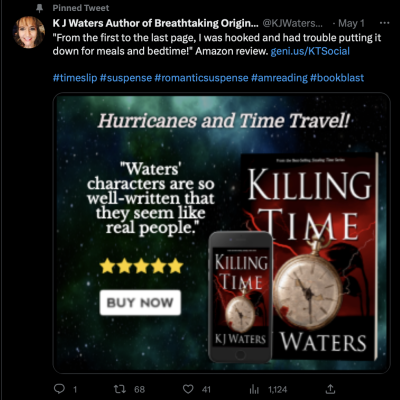
If you’d like to learn about how authors should market themselves on Twitter, Booklinker has a guide!

Instagram boasts over 1.28 billion users, making it one of the largest platforms out there. Instagram trends younger (mid 20’s) than Twitter and Facebook.
The main content types on the platform are images, videos, and reels. Reels are Instagram’s take on TikTok, where users can create short video form content with heavy edits.
Tip!
- Instagram is a very visual platform, with little to no text, so it can be a great platform to give off a mood that connects to your brand.
I write time travel stories set in storms, so I share severe weather, locations, time periods, and buy links.
Similar to Twitter, hashtags are super important on the platform for content discovery. #Bookstagram is the #BookTok equivalent and is where authors and readers go to talk about books on the platform.
Instagram is owned by Meta, so any ads are created and run on Meta ad platform and can easily be shared on Instagram.
Instagram’s Strengths
- Visual platform
- Hashtags are powerful for discoverability
- Reels are taking off in popularity
- Trends for a younger audience
Instagram’s Weaknesses
- Not suitable for long form content
- Hard to direct traffic off the platform
Why Should Authors Use Instagram?
If you love taking photos and creating graphics, Instagram can be a great platform. This doesn’t necessarily need to be videos of yourself, but just any content in the form of video or still pictures.
Example of an Author Doing Instagram Well: Elise Bryant
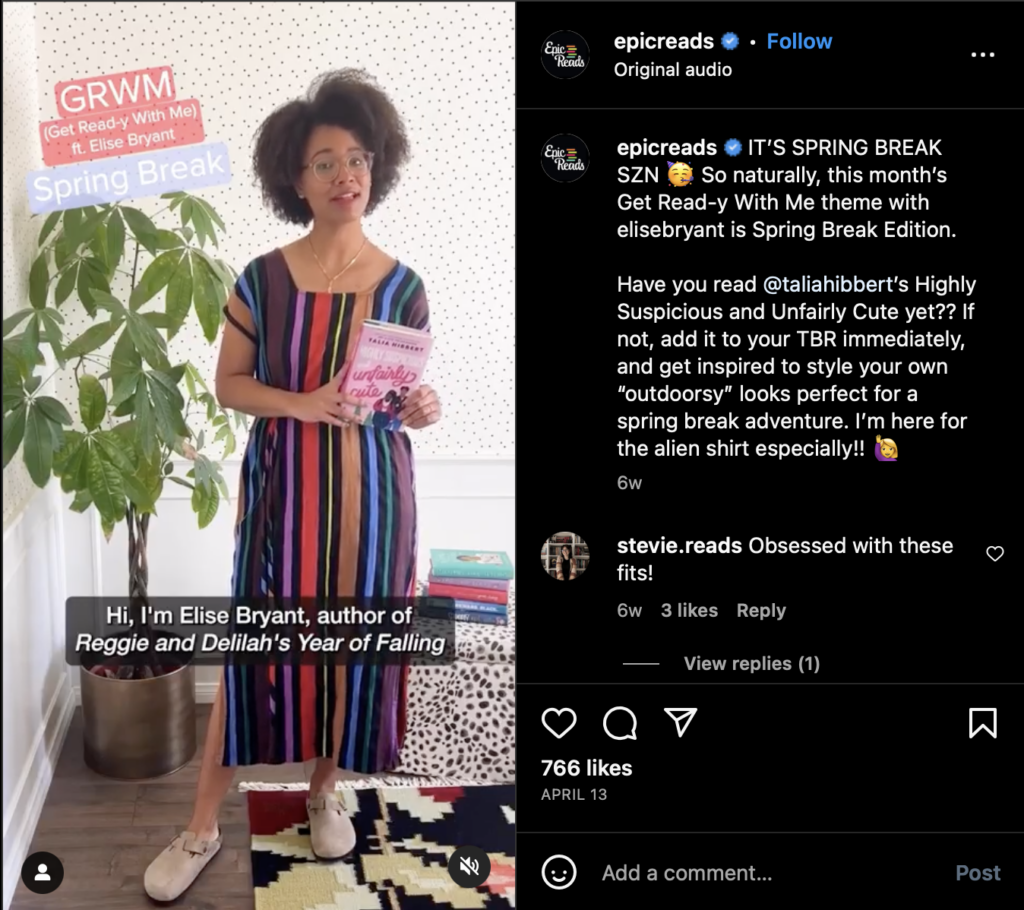
Elise Bryant has done quite well on Instagram with over 11k followers. Her Instagram consists mostly of photos of herself and creative reels.
Her content is typically sharing author updates, personal life stories, and the occasional book marketing post.
Her bio contains a LinkTree where she places links to all of her books.
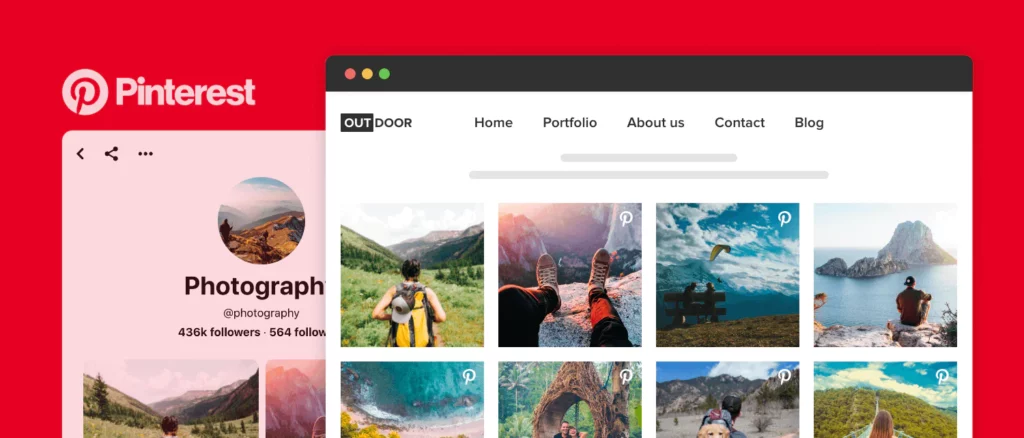
Pinterest is a unique platform in that it is a visual search engine. The main content on the platform are “pins” in the form of images and captions that go on boards (think of these like bulletin boards).
These pins typically lead to a longer form piece of content like a blog post, recipe, or video. Pins are organized into boards with similar content and users can share pins, follow boards to browse and engage.
Tip!
- Creative authors are using Pinterest to show fans a deeper dive into the worlds they’ve created with costumes, and exotic locations, book cover reveals, fan appreciation, book club extras, and more.
When I’m writing my novels, I save interesting finds in a secret Pinterest board that I reveal once the book is published.
Pins have a much longer lifespan than other social media content types, making it a powerful evergreen traffic tool.
Where a tweet might be seen for forty-five minutes, Pins are shown on the platform for up to a month, making it a great tool for authors.
The platform also has a lot of automations that makes it one of the more passive marketing channels.
Tailwind is the most popular scheduling tool on the platform, and there’s also a WordPress integration that allows your website to automatically share latest blog posts to Pinterest.
Pinterest Strengths
- Indexed to Google for discoverability
- Pins are seen longer than other platforms
- Visual platform leading to longer content
- Excellent for creating a mood around your books
- Hashtags are powerful for discoverability
- Platform allows authors to have more privacy
Pinterest Weaknesses
- There isn’t as much “networking” on the platform
- Engagement is through sharing pins, rather than conversations
Why Should Authors Use Pinterest?
Pinterest is an exceptional tool for authors who blog or anyone with longer form content.
If you are trying to be seen on search engines, it is an invaluable social platform.
If you’re not excited about the engagement required on other social platforms, this might be the place for you.
Example of an Author Doing Pinterest Well: Dhonielle Clayton
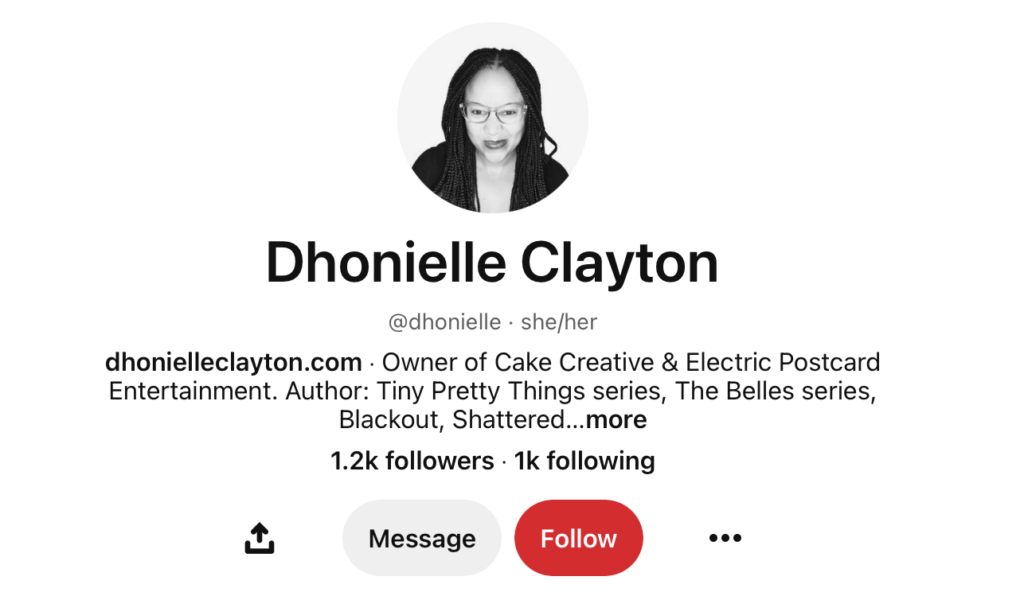
Dhonille Clayton has done an excellent job utilizing Pinterest for her author business.
Her Pinterest account has a variety of boards featuring different fashion, interior design, and art.
Because her books often include imagery similar to these aesthetics, naturally people that follow her board will be drawn to her books.
In order to make it easy for Pinterest followers to locate her books, she’s wisely created a board of her own books.
Goodreads
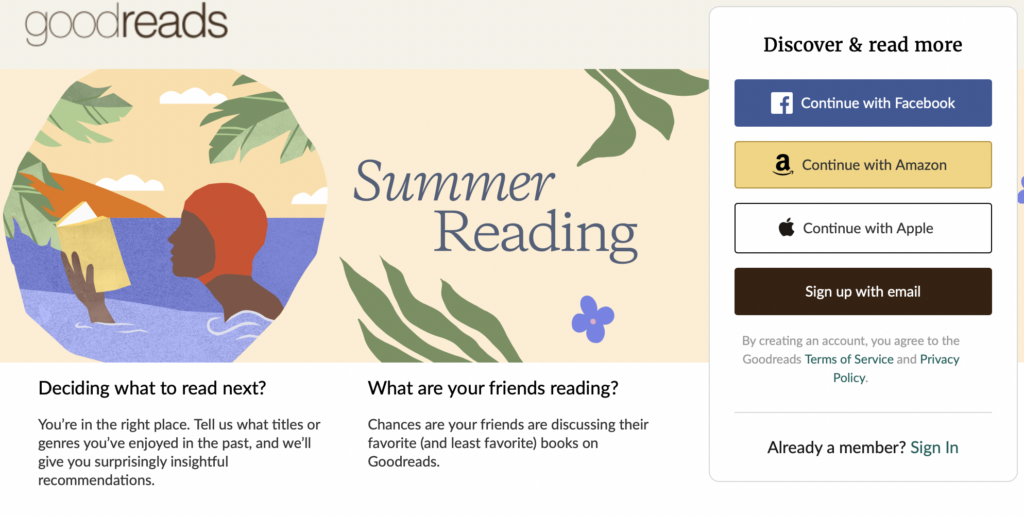
Imagine a social media network designed around books?
Goodreads originally started as a place for readers to share reviews of books, and place them on a digital “bookshelf” for others to find.
If you have a book published, you can sign up for a free author account, and start engaging with readers.
Now it is a dynamic, engaging place where 125 million readers gather. Goodreads has over 45 million monthly users, with a slight skew toward female users (52%).
Users of the platform are from all over the world, with USA and India leading the pack with the largest segment between 25 and 34 years olds.
It’s a strong platform for authors to connect with their readers.
It can be a little clunky at times, as it was built a long time ago, but they have a killer customer support team known as “librarians” that you can reach out for quick solutions to any problems.
It is one of the few social platforms where your readers can leave reviews of your books.
Goodreads also has an affordable giveaway program that provides a huge platform to give away up to 100 copies of your book. It only costs $119 and you have the choice of paperback or ebook prizes.
If you give away ebooks, they deliver the ebooks directly to the winners from your Amazon account at no additional cost. Winners receive a free book, automatically adding it to their “To Be Read” pile, where their followers will be alerted.
The books awarded become verified purchases on Amazon and those recipients will be prompted by Amazon to leave a review.
Goodreads Strengths
- Highly focused community of readers looking for books
- Owned by Amazon
- Offers affordable promotion opportunities
Goodreads Weaknesses
- A bit difficult to navigate
Why Should Authors Use Goodreads?
Tip!
- Goodreads is a no brainer for authors as it’s a social media network specifically for the book space. A little bit of effort on the platform can go a long way, in the form of free promo and extra book reviews.
Example of an Author Doing Goodreads Well: Jodi Thomas
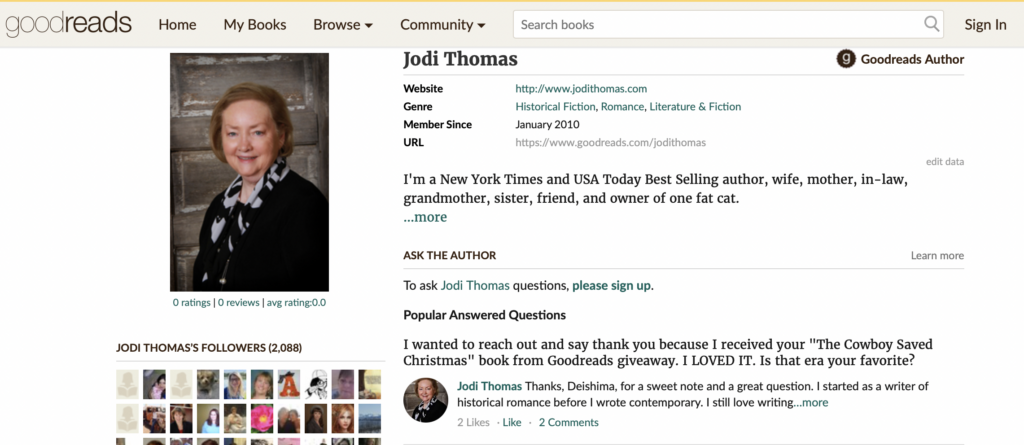
Jodi Thomas has connected her blog to Goodreads, where followers can engage with her, rate her books, and enter her giveaways.
Jodi also actively engages with her fans and answers questions in the “Ask the Author” section.
Lastly, she updates her bookshelf to what she’s reading in real-time, in order to engage with her audience and give exposure to other authors’ books.
Do this enough, and other Goodreads users will be sure to return the favor.
Bookbub
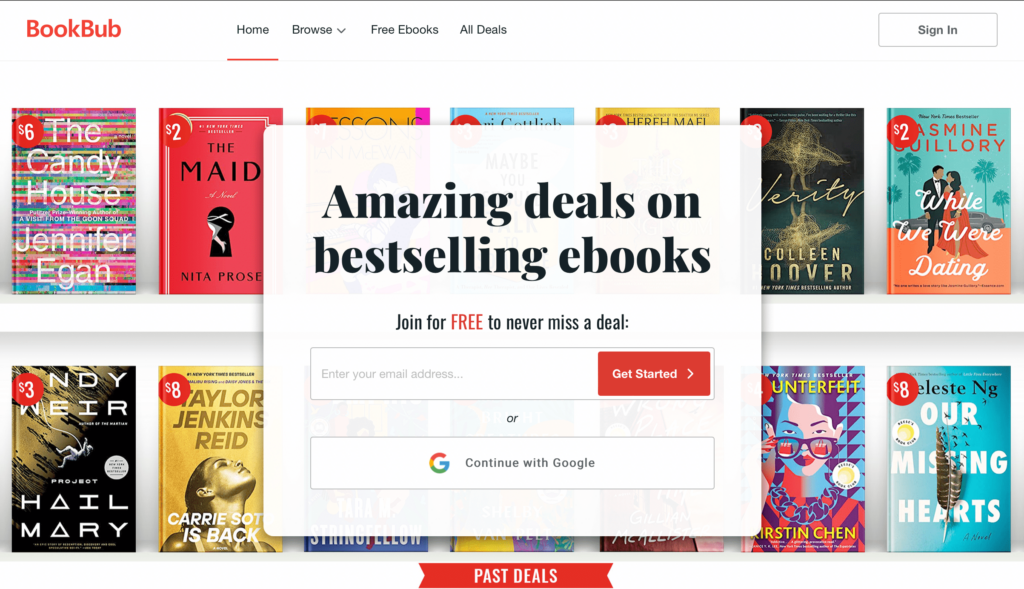
Bookbub is a popular platform entirely geared towards readers.
It started as an email list for readers to find books, but now has an author platform with promotional features and has grown to over 15 million users.
Like other social platforms, authors can grow their following but this site has an important distinction.
Once you hit 1,000 followers, BookBub will notify these folks when you release your next book. That’s a free email from a trusted source!
One strategy to use is to leave book reviews of similar authors’ books to grow your following and make those fans aware of your writing.
Tip!
- Bookbub also has a featured deal ad that is without a doubt one of the most powerful promotional tools out there in book marketing.
Additionally, they offer a pay per click advertising platform that can be an excellent book promotion tool for increasing sales. Booklinker will have a complete guide to Bookbub advertising out soon.
Bookbub Strengths
- Made specifically for readers
- Curated reader list by genre for promotions
- Another place for your readers to review your work
Bookbub Weaknesses
- Not as large of a user base as other social media networks
- Pay per click ads have a learning curve
Why Should Authors Use Bookbub?
Every author should claim your books on Bookbub and begin growing their following.
With a little effort, you can learn the ropes of promoting your books on their advertising platform, and take advantage of one of the most powerful book promotion sites out there.
Example of an Author Doing Bookbub Well: Tamera Alexander
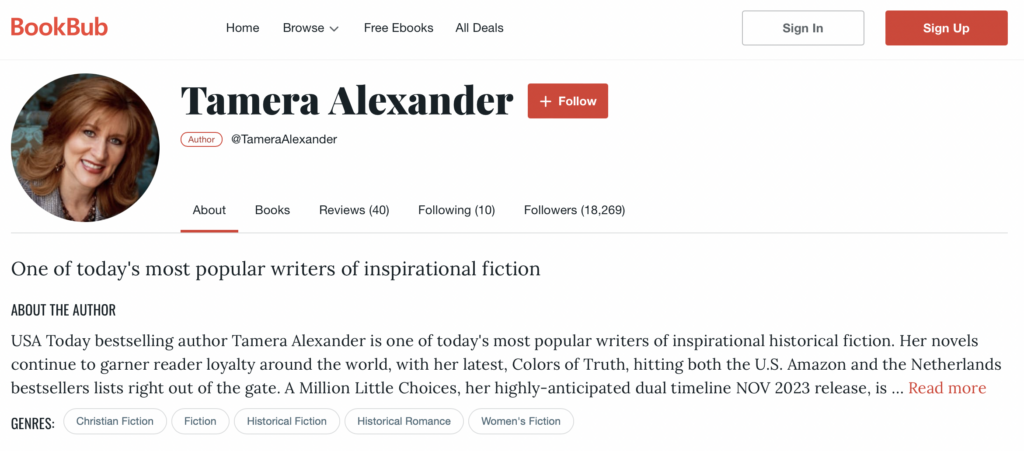
Tamera Alexander is a USA Today best selling author with a pretty impressive Bookbub profile.
With over 15 books claimed and 18k+ followers, she’s become one of the leading inspiration fiction writers on the platform.
Tamera has also left 40 book reviews on authors in her genre’s profile, which can help build her exposure to the aligned fan bases.
Social Media Scheduling Tools
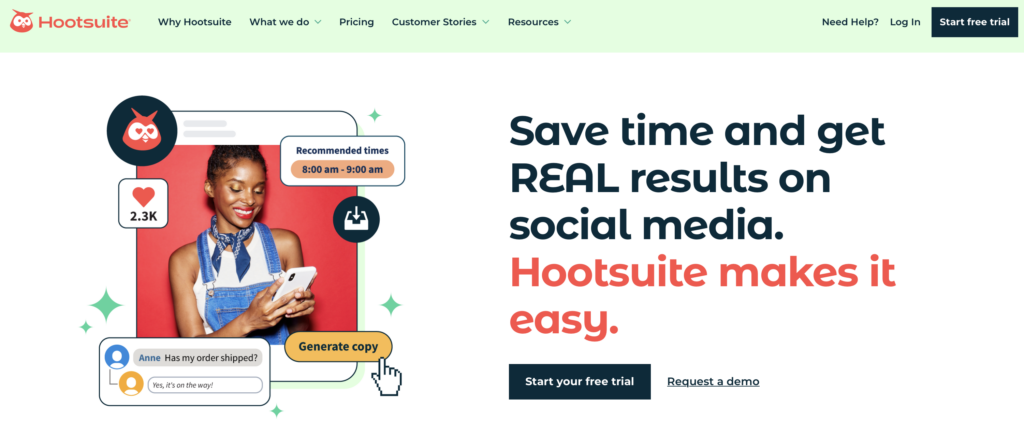
Tip!
- Social media scheduling tools are a useful option for authors wanting to automate their social media content. They can streamline your workload and push content asynchronously while you’re writing your next book.
Scheduling tools allow you to input content on the front end, and schedule them out to certain days and times. Most of these tools analyze your followers and determine the best times to post to reach them.
Popular options for scheduling tools include SproutSocial, Hootsuite, Buffer, and Recurpost.
Some authors, like Shawn Inmon, who wrote our ultimate guide to Facebook Author pages, don’t like scheduling tools as he feels like he misses the “spark of the moment” from his content.
At the end of the day, whether or not to use scheduling tools is a personal choice, but it’s important to be aware of them as an option.
Conclusion
Social media, if used correctly, can be an exceptional opportunity for authors to network with others in the industry, and promote their upcoming book.
It can also be a great way to waste your writing time and prolong your publishing dreams.
Curate content to attract an audience that reads your genre and buys books.
This concludes our ultimate guide to social media for authors.
If you’d like to learn more about a social media network, Booklinker has some networks covered already such as Twitter or Facebook Pages.
If there’s a certain social media platform you’d like us to cover soon, please let us know in the comments.
Or alternatively, if you have a question for KJ or the Booklinker team, we’d be happy to answer any questions promptly.

Introducing:
Booklinker Collections
One landing page for all your books. 100% free.
One link for easy sharing of your books across your backmatter, websites, emails, and social media.
Author
-
KJ Waters is the international best-selling author of the Stealing Time Series (Stealing Time, Shattering Time, Killing Time) and the short story Blow. Her books are often found on the Amazon best seller list next to Outlander and Michael Crichton’s Dragon’s Teeth and have reached #1 international bestselling status.
https://www.kjwaters.com

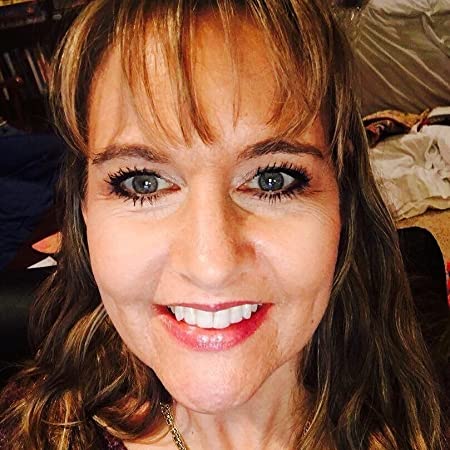

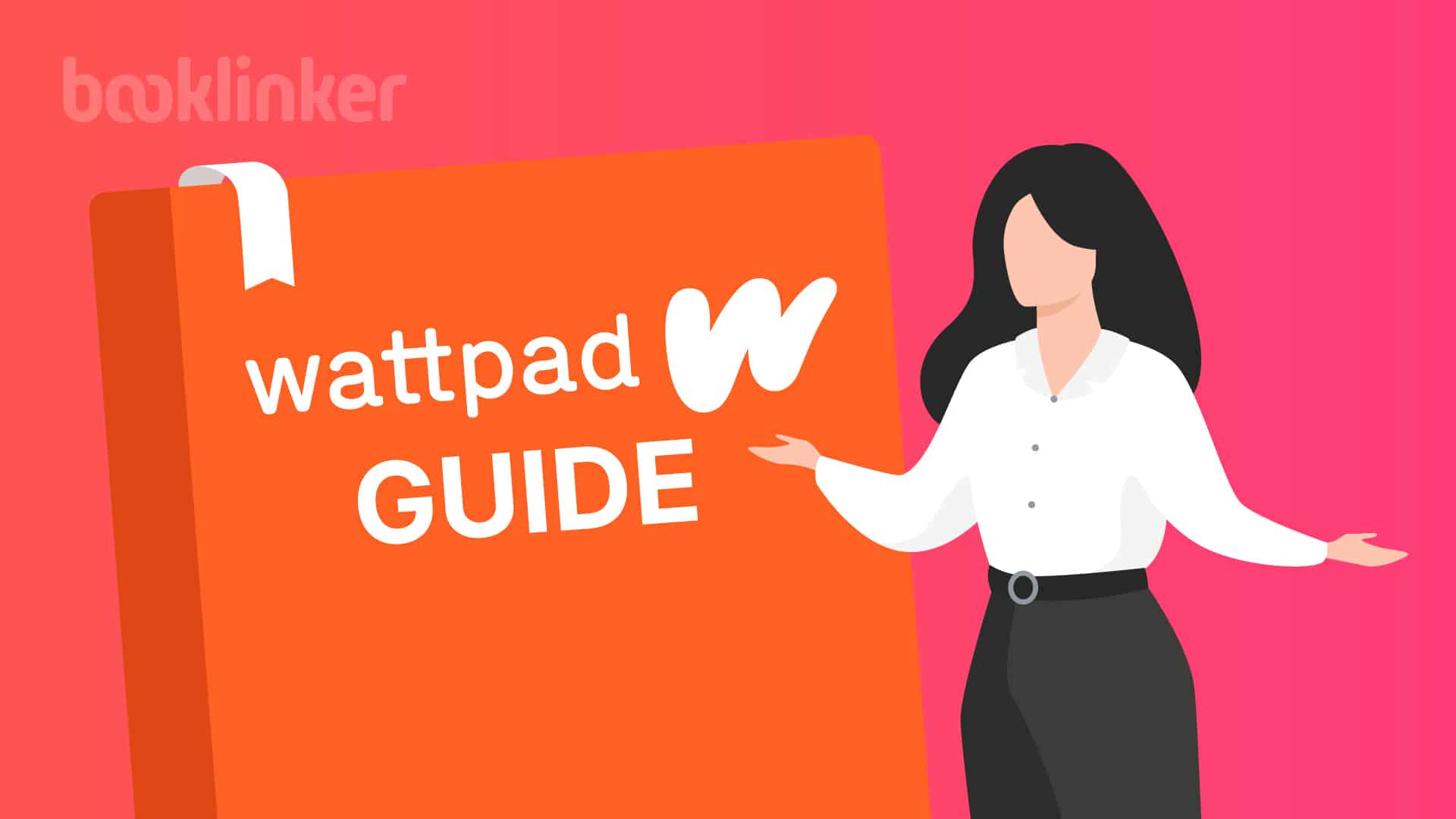
One Response
Absolutely agree! Social media should be about building genuine connections, not just pushing sales. Engaging with readers, joining relevant communities, and sharing meaningful content can go a long way in creating loyal fans. Tools like Booklinker definitely help streamline efforts and keep the focus where it matters!